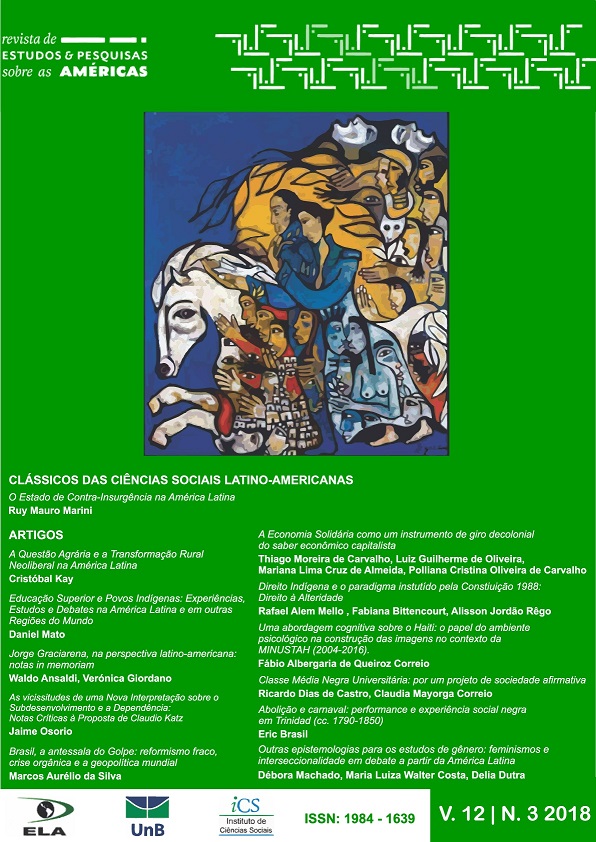Abolição e Carnaval: performance e experiência social negra em Trinidad (cc. 1790-1850)
DOI:
https://doi.org/10.21057/repamv12n3.2018.30939Palavras-chave:
Carnaval, Abolição da Escravidão, Caribe, Trinidad, Performance negraResumo
Esse artigo pretende analisar as relações entre o processo de abolição da escravidão em Trinidad e as formas de mobilização social e performances carnavalescas de homens e mulheres negras entre o início da ocupação britânica da ilha até as primeiras décadas pós-abolição (cc. 1790-1850). Para tanto, o texto está dividido em três tópicos: no primeiro, iremos analisamos as formas de participação de homens e mulheres negras durante a vigência do regime escravista na ilha, assim como as tentativas coloniais de repressão e controle e os argumentos da imprensa local na construção do mito do carnaval branco, ordeiro e civilizado (sic); em seguida, buscamos investigar os impactos demográficos, nas relações de trabalho e nas tensões sociais após 1834; por fim, focamos a análise na formação do Canboulay negro entre as décadas de 1830 e 1850, propondo uma reflexão sobre seus sentidos políticos num contexto de liberdade. A pesquisa utilizou um conjunto amplo de fontes primárias arquivadas na British Library e no National Archives em Londres, Inglaterra; obras de memorialistas, folcloristas e a produção historiográfica.
Downloads
Referências
BECKLES, H. Natural Rebels: A Social History of Enslaved Black Women in Barbados, Rutgers University Press, 1989a. BECKLES, H. and SHEPHERD, V. Saving Souls: The Struggle to End the Transatlantic Trade in Africans, Ian Randle Publishers, 2007b. BORDE, P.-G.-L. Histoire de l’ le de la Trinidad sous le gouvernement espagnol, Paris, Maisonneuve, 1876. BRASIL, Eric. „Carnavais Atlânticos: Cidadania e Cultura Negra no pós-abolição do Rio de Janeiro, Brasil e Porto de Espanha, Trinidad (1838-1920). Tese de doutorado. Programa de Pós-Graduação em História Social, Universidade Federal Fluminense, 2016a. BRASIL, Eric. „Carnaval como direito: A Revolta Canboulay de 1881, em Porto de Espanha, Trinidad.”Ÿ Revista Eletrônica da ANPHLAC, 0/0, pp.48”“77, 2016b. BRASIL, Eric. „Cucumbis Carnavalescos: Áfricas, carnaval e abolição (Rio de Janeiro, década de 1880)”Ÿ. Afro-Ásia, /49, pp.273”“312, 2014. BRERETON, B. A History of Modern Trinidad: 1783-1962, Portsmouth, Heinemann, 1981. BRERETON, B. Race Relations in Colonial Trinidad 1870-1900, Cambridge, Cambridge University Press, 2002. BRIDGENS, R. West India scenery with illustrations of Negro character, the process of making sugar, &c. from sketches taken during a voyage to and residence of seven years in, the island of Trinidad., London, R. Jennings, 1836. CLARKE, C. „Demographic Change and Population Movement”Ÿ in K. O. Laurence (ed.), General History of the Caribbean, Vol IV: The long Nineteenth Century: Nineteenth Century Transformations. Paris; Londres, UNESCO; Macmillian Educational, pp. 259”“282, 2011. COWLEY, J. „Music & migration : aspects of black music in the British Caribbean, the United States, and Britain, before the independence of Jamaica and Trinidad & Tobago”Ÿ Tese de Doutorado, 1992. COWLEY, J. Carnival, Canboulay and Calypso: Traditions in the Making, Cambridge, Cambridge University Press, 2003. CROWLEY, D. J. „The Traditional Masques of Carnival”Ÿ. Caribbean Quarterly, 4/3, pp.194”“ 223, 1956. CUDJOE, S. R. Beyond Boundaries: The Intellectual Tradition of Trinidad and Tobago in the Nineteenth Century, Wellesley, Massachusetts, University of Massachusetts Press, 2003. DAY, C. W. Five Years’ Residence in the West Indies - Vol I, Londres, Colburn and co, 1852. DIAS, J. „Uma questao de identidade: respostas intelectuais as transformaçoes economicas no seio da elite Crioula da Angola Portuguesa entre 1870 e 1930”Ÿ. Revista internacional de estudos Africanos, /1, pp.61”“94, 1984. DRESCHER, S. Abolition: A History of Slavery and Antislavery, Cambridge University Press, 2009. DRESCHER, S. Abolição: Uma história da escravidão e do antiescravismo, São Paulo, Editora UNESP, 2011. ELDER, J. D. „Cannes Brûlées”Ÿ. TDR (1988-), 42/3, pp.38-43 CR-Copyright © 1998 The MIT Press, 1998. FERGUS, C. „“Dread of Insurrection”: Abolitionism, Security, and Labor in Britain”Ÿs West Indian Colonies, 1760-1823”Ÿ. The William and Mary Quarterly, 66/4, pp.757-780, 2009. FERGUS, C. Revolutionary Emancipation: Slavery and Abolitionism in the British West Indies, Lousiana, Baton Rouge: Louisiana State University Press, 2013. FONER, E. Nada além da liberdade: a emancipação e seu legado, Rio de Janeiro, Paz e Terra, 1988. FRASER, L. M. History of Trinidad., Port-of-Spain, G.P.O, 1896. HANDBOOK OF TRINIDAD AND TOBAGO., Port-of-Spain, Government of Trinidad and Tobago, 1924. HOLT, T. C. The Problem of Freedom: Race, Labor, and Politics in Jamaica and Britain, 1832-1938, JHU Press, 1992. INNISS, Lewis O. Carnival in the Old Days (From 1858), Beacon, Vol.1, No.12, April 1932, pp. 12-13 LIVERPOOL, H. C. Rituals of Power and Rebellion: The Carnival Tradition in Trinidad and Tobago, 1763-1962, Chicago, Research Associates School Times, 2001. LÓPEZ. Rafael Brea. Santiago de Cuba: Carnaval y guerras de independencia (Siglo XIX). Batey. Revista Cubana de Antropología Sociocultural. Vol. III, Nº 3, 2013. pp. 98-113 LOVELACE, E. „The Emancipation-Jouvay Tradition and the Almost Loss of Pan”Ÿ. TDR (1988-), 42/3, pp.54”“60, 1998. MATTHEWS, G. „Trinidad: A Model Colony for British Slave Trade Abolition”Ÿ. Parliamentary History, 26/4S, pp.84”“96, 2007. MATTHEWS, G. Caribbean Slave Revolts and the British Abolitionist Movement, Louisiana State University Press, 2006. MEITCHELL, R. „Significando: carnaval afro-creole em New Orleans do século XIX e início do XX”Ÿ in M. C. P. Cunha (ed.), Carnavais e outras F(R)estas. Ensaios de história social da cultura. Campinas, SP, Editora da Unicamp, pp. 41”“70, 2002. MOORE, R. D. Nationalizing Blackness: Afrocubanismo and Artistic Revolution in Havana, 1920”“1940, Pittsburgh, Pa, University of Pittsburgh Press, 1997. NEPOMUCENO, N. (Bebel) „Festas negras do ciclo natalino no século XIX na América do Sul e no Caribe”Ÿ. Revista Latino-Americana de Estudos Avançados, 1/1, pp.101”“117, 2016. PEARSE, A. „Carnival in Nineteenth Century Trinidad”Ÿ. Caribbean Quarterly, 4/3, pp.175”“ 193, 1956a. PEARSE, A. „Education in the British Caribbean: social and economic background”Ÿ. Vox Guyanae, 2/1, pp.9-24, 1956b. PIRES, A. L. C. S. I prensa ne ra paulista e as associa es dos ho ens de cor pol tica e cultura no Brasil republicano (1915-1945), Belo orizonte, Fundação Universidade Federal do Tocantins, 2006. POWRIE, B. E. „The Changing Attitude of the Coloured Middle Class Towards Carnival”Ÿ. Caribbean Quarterly, 4/3/4, pp.224-232, 1956. SAMAROO, B. „The imigrant Communities”Ÿ in K. O. Laurence (ed.), General History of the Caribbean, Vol IV: The long Nineteenth Century: Nineteenth Century Transformations. Paris; Londres, UNESCO; Macmillian Educational, pp. 223”“258, 2011. SAN MIGUEL, P. „Economic activities other than sugar”Ÿ in K. O. Laurence (ed.), General History of the Caribbean, Vol IV: The long Nineteenth Century: Nineteenth Century Transformations. Paris; Londres, UNESCO; Macmillian Educational, pp. 104”“133, 2011. WILLIAMS, E. History of the people of Trinidad & Tobago, New York, Praeger, 1964. WOODING, H. O. B. „The Constitutional istory of Trinidad and Tobago”Ÿ. Caribbean Quarterly, 6/2/3, pp.143-159, 1960 YELVINGTON, K. A., Sainton, J.-P., Hector, M., and Casimir, J. „Caribbean Social Structure in the Nineteenth Century”Ÿ in K. O. Laurence (ed.), General History of the Caribbean, Vol IV: The long Nineteenth Century: Nineteenth Century Transformations. Paris; Londres, UNESCO; Macmillian Educational, pp. 283”“333, 2011.
Downloads
Publicado
Como Citar
Edição
Seção
Licença
a. Autores mantém os direitos autorais e concedem à revista o direito de primeira publicação, com o trabalho simultaneamente licenciado sob a Licença Creative Commons Attribution que permite o compartilhamento do trabalho com reconhecimento da autoria e publicação inicial nesta revista.
b. Autores têm autorização para assumir contratos adicionais separadamente, para distribuição não-exclusiva da versão do trabalho publicada nesta revista (ex.: publicar em repositório institucional ou como capítulo de livro), com reconhecimento de autoria e publicação inicial nesta revista.
c. Autores têm permissão e são estimulados a publicar e distribuir seu trabalho online (ex.: em repositórios institucionais ou na sua página pessoal) a qualquer ponto antes ou durante o processo editorial, já que isso pode gerar alterações produtivas, bem como aumentar o impacto e a citação do trabalho publicado (Veja O Efeito do Acesso Livre).
















